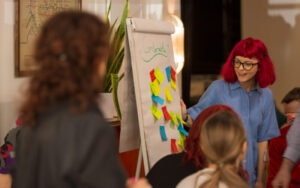Recently an ORSC practitioner reached out to the community for some evidence. A client asked her for statistics, showing that teams are more effective than individuals working alone.
I don’t know of any research studies that definitively prove, one way or the other, whether teams always deliver better outcomes than high performing individuals. The question though, got me thinking about my own experience.
The pros and cons of lone working
As a solo entrepreneur, I work on my own most of the time. I really enjoy it too. I like setting my own personal and business goals — and achieving them. More than anything, I really enjoy the space and freedom to be creative on my own terms.
Many people dream of being their own boss. Some personality types naturally thrive outside of the rules and norms of a mainstream workplace environment. Unconstrained by any requirements to justify, to compromise, or to reach consensus, creative and entrepreneurial types are free to explore all opportunities and embrace innovation.
Independent workers also get to determine their own schedules. You can shape your own workflow and adapt your work environment to play to your strengths. I am generally self-motivated and good at self-management and this definitely helps.
I try to plan my schedule to match my energy levels. I’ve learned to recognise my optimal working hours. If you see me at 5.30am, I’m full of energy. I have a ‘can do’ attitude and that ‘life is great’ feeling. I’m ready to go! By around 11am it’s a different story. I’m in a more calm and considered space. I find it’s a great time for reflection on work and writing submissions. By 4pm I’m tired. If not well prepared, I can be more negative. I tend to see much more risk.
The flip-side of lone working is in these low moments, when it can get lonely, without a co-worker to boost you up, help you refocus and rebalance. Moreover, with nobody working alongside you to bounce-off and reflect through, how can you always be sure you’re doing things right — or even doing the right things?
Team working benefits
I wonder if I’m actually more productive, and perhaps even deliver better programmes, on the occasions when I collaborate with others. I know I need to hear what others think. Feedback loops are a solid basis to interrogate and adjust behaviour and strategy. Relationship Systems Intelligence — the concept of individual egos combining into something much greater — is the foundation of ORSC and team intelligence is certainly a great facilitator of critical thinking.
In a team you get to be acknowledged, feel heard and feel validated. You also get to be challenged and pushed out of your comfort zone – opening up new potential. When a group pools their unique skills to a shared goal, it will often create more effective solutions than an independent approach. Plus I also like spending time with people who are smarter than me, who are masters in their field and bring different perspectives.
Working with others on a day to ay basis, you also get to share laugher and enjoy moments of levity, which is great for mental health. It certainly improves my own sense of wellbeing.
Remote, not alone
For me, working on my own has provided huge benefits and mostly it suits my professional style. But without being part of a team I know I’m at risk of losing perspective, connection and purpose. I wonder if the solution is that we all need a combination of both approaches?
Forward-thinking organisations already embrace remote working solutions. Offering this kind of flexibility is much more likely to get the most from diverse individuals. By recognising unique strengths, weaknesses and personality types — and being willing to allow some freedom in determining our own optimal work environment — we will inevitably increase productivity, innovation, and job satisfaction.
I’m lucky to have the best of both worlds. I may be a lone wolf in my day to day, but I’m also a very grateful member of several inspirational ‘packs’.
Foremost, the ORSC UK Community and our Steering Group. We meet virtually once a month, for a two hour planning and strategy discussion. We also teleconference every Friday, just for 15 minutes, to check-in, say what’s on our minds and have a bit of a laugh. We call these our ‘Zoom-water-cooler’ chats.
I also appreciate collaborating regularly with other ORSC practitioners, whether co-facilitating workshops or attending ORSC UK community learning and development events. I’ve been working a lot with the Agile Coaching community too, and it’s Agile coaches who have supported me to make some tough decisions recently (specifically Rickard Jones, John Barratt and Chris Nikitas!)
Of course, CRRUK is a member of the CRR Global family and I value the opportunity to connect regularly with my colleague there, GraceAnn Anderson. She brings the voice of the business into our conversations. She’s also at work at two in the morning to take my call!
Finally, I’m incredibly grateful to be able to interact daily with the many talented, capable coaches, leaders, and assorted professionals who attend our training courses. Thank you all!
[mks_separator style=”dashed” height=”2″]
Got a question about ORSC training? Get in touch, we’d love to hear from you.






